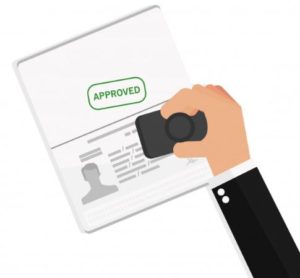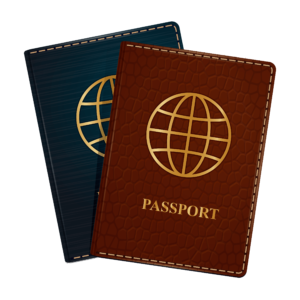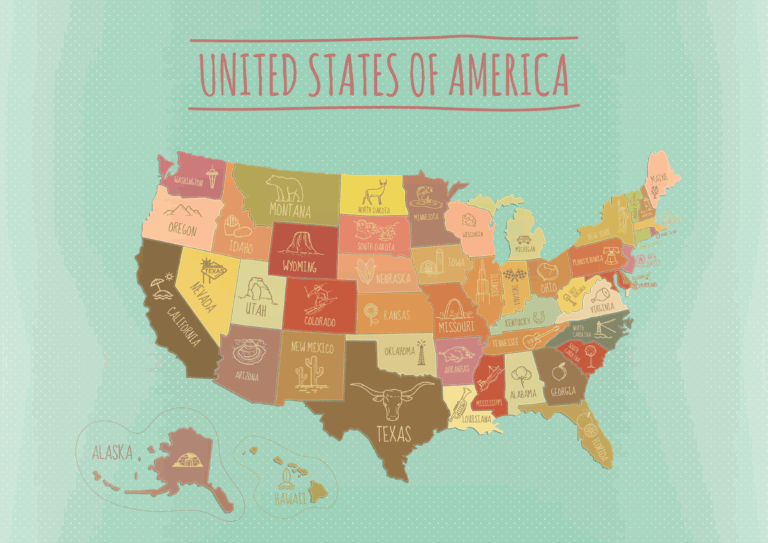Comprehensive Guide To Visa & Immigration
Comprehensive Guide To Visa & Immigration
The Ultimate Guide
to Visa & Immigration Laws
of the Best Countries to Study Abroad
Did you know that nearly 4.3 million students are enrolled in a study program outside of their home country?
That is quite a lot of number! While that number is impressive, given that going abroad makes a student more independent and that he/she gets to study in a multicultural environment, it is also equally important for students to know the implications of studying abroad.
Choosing a country of their own choice, is not as easy as making a travel itinerary.
Many pointers must be noted down, such as rules for getting a study visa for studying in that country,he/she duration of the study permit, the terms and conditions which must be followed, the procedure to get a work permit after completion of studies, the job scenario in that particular country amongst others.
Click below for country-specific regulations


Why Is Targeting The Right Country
So Important?
Targeting the right country is as important as targeting the right school for your study abroad program.
This is because each country is better equipped to provide jobs in certain sectors.
For example, if one wishes to work in the automotive industry, Germany is the best choice whereas students who wish to make their career in the consulting sector after their Master’s Program (such as Masters in finance, MIM or MBA ) UK can be a good choice. Hence, it is imperative for students to know that they are choosing the right country keeping in mind the job opportunities, job growth, opportunity to stay back after the completion of degree etc. Therefore, we have made your work easier and compiled all the above information for the most popular study abroad destinations!
Have a look and take the right decision!
Contents









United Kingdom
A non-EU/EFTA national wanting to work in the UK, will need a work permit or a work visa relating to the type of job sector. In most cases, the work visas in UK require sponsorships from the employer (generally UK-based employers) which means one must have a secure job offer and sponsorship ready in order to apply for a work visa. It is difficult and quite impossible to enter UK for a casual or temporary work visa as work visas are not available for causal or low-skill employment.
In case you are planning to stay in the UK for more than 6 months, then it is mandatory to apply for a Biometric residence permit as well.
Since the Conservative authorities kicked off the post-study work visa, which allowed students from outside the EU to operate in Britain for up to two years after finishing their Masters degree, scholars from countries like India have been in the middle of a heated immigration debate in Britain, together with the authorities firmly opposing movements to ease limitations.
The student from non EU countries like India, are only eligible to apply for Tier-2 visa post they obtain their diploma or their scores or degree or after they submit the thesis. International students get Tier-4 visa, which can be valid for the length of the class and a couple of months more. In the event the students are not able to find work in this time, they are made to return to home.
Employers wishing to employ non-EU employees under the usual visa — tier-II — should receive a license to do so. Also the student must land a job paying at least £ 20,800 a year with an employer having this license in just four weeks of finishing their program, otherwise they have to find an essential sponsorship as an entrepreneur.
Until they receive their final results, students doing phd or Master Degree on Tier-4 visas can’t apply for Tier-2 visas. Also those doing the post-graduate diploma or PGD are restricted to apply for Tier -2 visas.
Due to strict work-visa regulations, it is imperative to be mindful of your long term career plan while targeting UK Schools.
Am I Eligible?

The two most important eligibility criteria for UK work visa are: a valid job offer and sponsorship (from the employer).
There is a UK immigration points-based assessment system which determines ones eligibility for a work visa from the points scored under this assessment system. The sections under which points are awarded under this system are as follows:
- Qualifications
- Future expected earnings
- Sponsorship
- English language skills
- Self-provided funds
The Tier 2 visa (general visa) or the UK work visa is the main route for immigration into UK for people with a valid job offer. There are different categories of visas within the Tier 2 or general and there are two ways in which you can apply for the same.

Tier 2 visas are general granted for a period of 6 years.
Yet this might vary according to duration of appointment, experience and salary rate.


























- Currently no UK work visas are available for low-skilled jobs in the UK for non-EU/EFTA nationals as these job positions are filled by the UK and EU/EFTA nationals.
- If labour shortages emerge as a result of Brexit, this situation might change.
- With the introduction of the points-based system in 2008, there were speculations about the issuance of Tier 3 UK work visas for low-skilled jobs but it hasn’t been implemented yet.










- The job scenario in UK is quite promising, given it is the third largest economy in Europe and has a very low unemployment rate.
- There has been a rapid rise of around 40 percent in the employment levels over a couple of years amongst non-UK nationals working in UK.
- The job market is flourishing with numerous job opportunities on offer.
- If you are a professional with good English speaking skills, seeking a job in the UK, securing a work permit in UK will be an absolute easy ride.
- It is very easy for Scientists, Engineers, Medical practitioners, professional musicians, ballet dancers, chefs to find a job in UK.








France
Nationals from countries in the EU, EEA or Switzerland, are free to work in France without any kind of restrictions. Other nationals who want to do paid work in France are required to find a prospective employer before arriving in France, who (on their behalf) will contact the foreign labour section of the DIRECCTE (Regional directorate for enterprises, competition, consumption, work and employment) for authorization of a French work visa. Once the contract is approved, it is forwarded to the OFII (L’Office Francais de l’Immigration et de I’Integration) and then to the embassy/consulate in your home country. After this, applicatios can be made towards visa/ residence permit.
Am I Eligible?


There are different types of work visas and residence permits in France, each of which has its own requirements, length of validity and conditions, for specific work or types of worker.
The new “Talent Passport” permit
In an attempt to attract more foreigners, the French government (in 2016) has made the process of obtaining certain working permits for non-EU/EEA/Swiss citizens, easier and convenient. The ‘passeport talent’ permit is one such permit which now includes the following ten categories:
- skilled recent graduates
- employees of an innovative company
- highly-skilled workers (EU Blue Card holders)
- employees on a ‘mission’ with a French work contract
- researchers/scientists
- champions of an innovative economic project
- economic or financial investors
- company representatives
- artist/performers
- a person internationally or nationally renowned in science, literature, arts, education, sports, and so on
Thus, if you are come under any of the above categories and are working on some project that can make some a ‘significant contribution’ to the French economy, especially in the fields of intellectual, scientific, cultural, sporting or humanitarian grounds, then you eligible to apply for this four-year, renewable residence permit.
Some of the general requirements for this permit are as follows:
- Documents such as, a bachelor’s degree or higher, a detailed CV/resume, information about the work you’ll be involved with, and evidence of sufficient funding (as determined by the French authorities).
- Must meet all the criteria set out by the Commission Nationale des Competences et Talents,
- Evidence of a work contract, at least for 3 months, approved by the DIRECCTE (if an employee, it should be arranged by your employer).
Scientists/researchers permit
An eligible candidate having a masters degree (or equivalent) or higher, and looking forward to carrying out research or teaching at the university level, will be granted the temporary ‘scientific activity’ residence permit (carte de séjour temporaire ‘mention scientifique’). Though this permit is valid for one year, it can be renewed every year for up to four years. Evidence of the status, duration and nature of work along with a ‘hosting agreement’ (convention d’accueil) from a recognised scientific organisation or university needs to be provided for this permit.










There are two kinds of work permits in France: less than 90 days and more than 90 days.














Working for less than 90 days (3 months)
- For people working in France for a duration less than 90 days, the employer must get their temporary work permit approved by the French Ministry of Labour, theDIRECCTE (Direction regionale des enterprises, de la concurrence et de la consummation, du travail et de l’emploi), or a convention d’accueil stamped by the localprefecture (French local authority/administrative office) in case of scientists, researchers or teachers.
- This work approval then goes out to the home country of the candidate where he/she can apply for a visa.
- For working in France for less than 90 days, a short-stay work visa is required (exempting EU/EEA/Switzerland nationals).
- People from Australia, Antigua and Barbada, Bahamas, Brazil, Canada, Israel, Japan, Mauritius, Mexico, St Kitts and Nevis, Seychelles, Singapore, S. Korea, US or Venezuela do not need a visa for entering into France but will have to make sure that their employer has arranged a valid work permit (convention d’accueil) during the time of travel.
Working for more than 90 days
- For people planning to work in France for more than 90 days/3 months, must apply for a long-stay work visa in France, which also works as their residence permit. In this case, the employer has to create a work contract and send it to the local division of the French Ministry of Labour, the DIRECCTE (Direction regionale des enterprises, de la concurrence et de la consummation, du travail et de l’emploi).
- After approval by the OFII, the contract will be sent to the French embassy or consulate in the home country of the candidate which is authorized to issue French work permits for non-EU citizens.
- The candidate then has to visit the embassy/consulate along with documents such as a valid passport, completed application form and other specified documents. After arriving in France, the candidate then has to register with the OFII.










- Speaking French is very important for those seeking a job in France, otherwise finding employment within France can be extremely difficult.
- The unemployment rate of France at the end of 2016 was 9.7percent, a rise from the 10.5 percent of the previous year record.
- For French speaking people, there are a lot of vacancies and scopes among various sectors across France and the employment levels are expected to rise too.
- In 2017, the minimum salary was around EUR 9.76 per hour (around EUR 1,480.27 gross per month).
- Some of the major industries in France are aerospace, motor industry, pharmaceuticals, electronics, textiles, tourism, metallurgy, industrial machinery, IT, banking and food & drink. IT and banking sector have the highest employment growth and majority of the French population works in the services.
- People having relevant management skills or a management degree are eligible to apply and be considered for a number of jobs in various sectors. Tourism, hospitality sector, retail and agriculture are also some of the sectors where one can consider finding employment. Persons with good English speaking skills are eligible to apply for English language teaching jobs as well.
- Graduates can find jobs with big multinationals or large national employers.
- So in short, to be able to find work in France keep in mind these three things: learn to speak French, create networks across France, indulge in local experiences.


China
The qualified international students who are studying (or have studied) in Chinese universities will be granted work permits and employment licenses. While on the other hand, qualified students studying (or having studied) in foreign universities will first be granted work permits, followed by an employment license after arriving in China and obtaining a work visa to work in China.
The employment licenses for foreign graduates are valid for a period of one year upon their arrival, with subsequent licenses being valid for up to a period of five years at a time.
Exceptions happen, in case of some students who will be allowed to work (either part time or during holidays) whilst they are studying in China. Working can be a wonderful way to gain additional experience and enhance or improve your employability or find job opportunities after you graduate. There are legislations for students to work in China so make sure to check to ensure that you fulfill all requirements. Previously, international students were not allowed to work in China, but now students are allowed to undertake internship works, given they have been granted permission from their Universities.
Am I Eligible?


Among the many changes that have been recently made into the Chinese work visa, the following are some of those requirements:
- To be 18 years or older, in good health and to have no criminal record.
- To have average grade of at least 80% (B or higher)
- Have a relevant degree or education certificate
- Have a job confirmation (needs to match your major)
- A higher salary than locals
- Have a passport or equivalent travel document.
Z-Visa
Z-Visa is the official work visa of China for which the following documents are required:
One of the following documents:
- Original Foreigners Employment Permit of the People’s Republic of China issued by the Chinese government authorities for Human Resources and Social Security. For work period of less than 90 days, original approval of short-term employment for foreigners working in China is needed.
- Original permit for foreign expats working in China issued by the State Bureau of Foreign Experts.
- Notification letter of Foreigner’s work permit in China issued by the State Bureau of Foreign Experts.
- Registration certificate of Resident Representative Offices of Enterprises of Foreign countries (regions) issued by Chinese authorities of industrial and commercial administration.
- Original approval document for commercial performances issued by the Chinese government authorities for cultural affairs. For work period of less than 90 days, an original Approval of Short-Term Employment for Foreigners in China is required.
- Original letter of invitation to Foreigners for offshore Petroleum Operations in China issued by China National Oil Corporation
- Personal statement (on written format), covering the details of place to visit, name, address and contact number of the inviting company or person.
- Other documents required by the Chinese Embassy and Consulate-General.










The Z visa (or the Chinese work visa) only allows 30 days for stay, from the date of arrival in China, during which time the candidate and the employer must seek a Temporary Residence Permit for the duration of the contract, to the minimum of 90 days and the maximum of 5 years.














- Within 30 days of entry into China (unless the duration of stay on the visa is marked as 30 days), a Z-category visa holder must apply for a residence permit at the local public security authorities
- Additionally the applicant has to do the following:
- Guarantee that all the information provided in the application is true and correct. Any false, misleading or incomplete information may result in denial of the visa or refusal of entry into China.
- Make sure that the invitation letter may be in the form of fax, photocopy or computer printout. If required, the consular officer may ask the applicant to provide other documents or supplementary materials, or require an interview with the applicant.
- The consular office will then decide on whether or not to issue the visa and on its validity, duration of stay and number of entries in light of specific conditions of the applicant.
- A holder of the Z-category visa should enter China within 90 days after the visa is issued and must register at the local public security bureau within 30 days of arrival, where the China Residence Permit will be issued to replace the Z-visa in order to facilitate multiple entries for a period of one year.










- China is a booming economy and this makes it easier for international students to find jobs here which they are unable to find in their home countries.
- There are a plethora of job opportunities for young graduates in China.
- For students interested in post-study work in China, it is advisable to search for job openings online through their University café advertisements, browse job websites, job classifieds attend networking events, ask University professors to recommend you in industries where they have links.
- Additionally, one can always directly contact the target companies while seeking job roles.
- Just like France, in China too, speaking Chinese can give you an extra edge over others. So if you are planning to work in China post-University or move to China for work, then start putting efforts to learn or brush up your Chinese language skills.


Canada
Foreigners wanting to work in Canada will need a work permit to work in Canada. Different work permits are issued based on whether you are a student who has completed at least 8 months of studies in Canada or other types of permits if you are not eligible to the Post Graduation Work Permit like Open Work Permits and Employer Specific Work Permits.
Read more about the other types of work permits here https://www.canada.ca/en/immigration-refugees-citizenship/services/work-canada/permit/temporary/work-permit-types.html
Am I Eligible?


You can check if you are eligible to apply for visa in Canada through this official online tool.https://www.canada.ca/en/immigration-refugees-citizenship/services/come-canada-tool.html
To get a post-graduation work permit:
- You must be 18 years or older.
- You must have continuously studied in Canada for atleast 8 months long, full time.
A document from your school is required that states that you have passed all your program requirements.
- You must have a valid study permit.
- You must apply for a work visa within 90 days of completion of your program.
- You must have graduated from public post-secondary school, such as a college, trade/technical school or university, or CEGEP in Quebec or/private post-secondary school that operates under the same rules as public schools (currently applies only to certain private post-secondary institutions in Quebec) or/private secondary or post-secondary school (in Quebec) that offers qualifying programs of 900 hours or longer, leading to a diplôme d’études professionnelles (DEP) or an attestation de spécialisation professionnelle (ASP) or/ Canadian private school that can legally award degrees under provincial law (for example, Bachelors, Masters or Doctorate degree) but only if you are enrolled in a study programs leading to a degree as authorized by the province










Canadian private school that can legally award degrees under provincial law (for example, Bachelors, Masters or Doctorate degree) but only if you are enrolled in a study programs leading to a degree as authorized by the province.
The duration of a post-graduation work permit depends on the length of your course. If the program duration was:
- Less than 8 months: Not eligible for work permit
- More than 8 months, but less than 2 years: a work permit equivalent to the duration of your course time is issued.
- 2 years or more: A PGWP of 3 years is issued.
- More than one program: Valid up to 3 years.


























The duration of a post-graduation work permit depends on the length of your course. If the program duration was:
- Less than 8 months: Not eligible for work permit
- More than 8 months, but less than 2 years: a work permit equivalent to the duration of your course time is issued.
- 2 years or more: A PGWP of 3 years is issued.
- More than one program: Valid up to 3 years.










- Canadian job markets have been increasingly attracting international students to pursue their masters there.
- Having the right skills in the domain you want to find a job in is enough for you one to find a job easily in Canada.
- As Canada is a bilingual country, with both French and English being the two official languages, having some knowledge of French would put you a step forward than the rest of the competition, while applying for jobs.








Germany
The German government funds the tuition fees of the majority of colleges in Germany, making it one of the best countries to study in, if you are looking forward to spend as less money as possible. The only fees that you would pay would be administrative fees or student clubs fees, which add up a to a few hundred euros.
The employment licenses for foreign graduates are valid for a period of one year upon their arrival, with subsequent licenses being valid for up to a period of five years at a time.
Am I Eligible?


- Here is a list of pointers that make an individual eligible to apply for the German Visa:
- The student must have received an acceptance letter from a German University
- Proof of booked and paid accommodation in Germany.
- A valid health insurance covering the total number of days you will be studying in Germany.
- ·A formal statement from the bank regarding your financial situation for the last 3 months.
- Your passport has to be valid for at least 6 months to apply for Schengen Visa for Germany.




































There are 3 types of German Visas for study purposes:
Language Course Visa: For those who want to learn the German language in Germany
Student Application Visa: If you haven’t gotten the confirmation letter from a German University yet.
Student Visa: If you have already gotten a confirmation letter from a German University.
Work visa is not required for citizens of EU, USA, Australia, Canada, Israel, Japan, New Zealand, Switzerland ad the Republic of Korea. They can apply for the residence permit without a visa, directly in Germany.
The 3 different Residence Permits are:
General Employment
Specialist Professional
Self Employed
One can also opt for a EU Blue Card. After having received the EU Blue card for a period of 2 years, one gets a residence permit without a time limit.










- The good news is that there are plenty of job opportunities in Germany.
- By attending job fairs and workshops, one increases their outreach of professional network, hence increasing one’s chances of landing a job as soon as possible. All the job requirements must be met at any cost, for you to be apply.
- Knowing the German language is highly recommended as it allows you to mingle with the locals.








U.S.A
The United States of America is one of the most popular destinations for students to pursue their higher studies. The main reasons would be the availability of top universities with world class campus facilities, well equipped teaching staff and the mere factor that there are a wide range of schools to choose from. According to the US Embassy, since 2017, there is a 12% increase in the number of students going to USA for studies.
Source: https://in.usembassy.gov/u-s-hosts-million-international-students-second-consecutive-year/
Am I Eligible?






































F1 Visa Requirements:
- Candidate must have a foreign residence where they intend to return after completion of their studies
- Candidate can study only at the academic institution via which the visa was granted.
- F1 students are eligible to apply for OPT to gather work experience in the form of internships, research, thesis etc. An OPT lasts for a cumulative period od 12 months per educational level.
- To get a temporary worker status in USA, one needs to get a H1B Visa. The employer must guarantee that they will be paying at least 95% of the prevailing wages to the employee. As the H1B visa is completely dependent on the employment, if a person is removed from employment, effectively, the visa is also terminated.










- With the new government in place and visa rules being tightened, foreign students may find it difficult to find a job in the USA. But, nevertheless, if you study in the top 20 to 30 universities in your field of area and prove your mettle, there are quite bright opportunities for students to make a living there.
- Also, targeting job market areas like California, San Francisco, Boston, Seattle etc can prove to be advantageous as these are bigger markets and have an unemployment rate of around 3 to 4%.
- Apart from having highly efficient hard skills, soft skills such as critical thinking, god writing skills, leadership skills, communication skills etc are highly valued when recruiting students.
- Source:https://www.usatoday.com/story/money/careers/employment-trends/2018/06/18/employment-best-cities-for-job-seekers-in-2018/35711339/








Russia
Russia, the biggest country in the world, has top universities with world class facilities and great infrastructure. It is a great place to study as the government offers funding for students in terms of giving stipends and free housing. There is 100% tuition fee exemption for students to attract more and more students from overseas. With so many benefits being offered to students, topped with the rich heritage and culture of Russia, it surely is one of the best places to pursue your higher education.
Am I Eligible?


Documents Required for Application:
- Passport
- Application Form
- Photographs
- HIV Negative Status Report
- Original Invitation by the university
- If a student has received admission from a university, a copy of the invitation which is issued by the university after paying the fees must also be submitted.










- The work permit for foreign students is valid for 1 year, which can then be extended further.


























- Initially, a student visa with 3 months validity is issued. You can then apply for a 1 year extension at the local division of General Administration for Migration Issues of the Interior Ministry of Russia.
- Visas are issued usually within 2 to 5 weeks.
- If you are 18 years and above, you are given a work permit, give that you are enrolled in a state accredited university, and are above 18 years old. The cost of a work permit is RUB 3,500 (USD $60).
- There are 2 types of work visas:
i. Single Entry Visa: Valid for only 90 days.
ii. Multi Entry Visa: This is reissued on the basis of a single entry visa for not more than 1 year.










- Moscow is Russia’s financial and economic centre- hence you can find many foreigners working there. It also has the lowest unemployability rate in Russia. Hence, it would be an ideal place, if you are looking forward to working in Russia. Another blooming job market would be in the city of St.Petersburg.
- Although it has a smaller job market as compared to Moscow, the average pay is better in St.Petersberg.
- Russia is also home to multinational companies like Google, Dolby, Goldman Sachs, Intel, Honeywell, Oracle, PepsiCo etc giving ample work opportunities to students.








Italy
With world class universities like University of Bocconi, University of Bologna, Italy is home to varied top universities. Its varied and vibrant culture attracts students from all over the world.
With affordable tuition fees, research opportunities and a rich heritage of education, Italy is surely a great place to pursue your higher education.
Am I Eligible?


General Documents Required for Italy Visa Application
A passport valid at least for 3 months
- Proof of means of financial aid
- Proof regarding the details of your accommodation in Italy. This isn’t required if you have sufficient funds to arrange for accommodation.
- 2 latest passport size photographs
- Medical Insurance/ Travel Insurance vi. Letter of acceptance from your university.
- A bank receipt that states that you have paid the fees viii. Travel Itinerary To convert a student permit to an employee permit, you must have completed the degree successfully in Italy and must have an offer for employment.
Here are the other requirements to get an employee permit in Italy:
- A letter stating the employment terms from your employer
- The employer’s recent tax records
- Employer’s business balance sheet
- Company Record
- Filed VAT tax return
- Employer’s telephone and email details
- Accomodation details
- Letter regarding the invoices issued by the company
Source: https://www.studiolegalemetta.com/en/convert-an-italian-student-visa-into-an-employment-visa/










- With a stay back period of 6 to 12 months after a masters’ program, students have enough time to find themselves a good job.


























EU students don’t need to obtain a student visa to study in Italy. A valid passport or an ID card would suffice.
- Non-EU students need a legitimate student visa to pursue a degree there.
- It is mandatory for students to apply for a residency permit, after their arrival.
- If you are already on a student visa in another country and wish to travel in the Schengen area, you have to apply for Schengen Visa first. There are two rules that you must be aware of, in this scenario:
- The period of stay in the country that you hold a student pass in must be longer than one month
- You can apply for the visa only if you are studying in the country you already hold a student pass in.










- According to the 2018 International Monetary Fund, Italy is the 8th largest economy in the world.
- Cities like Rome, Milan, Naples, Bologna have well established job markets.








Australia
Australia is highly competitive when it comes to higher education, owing primarily to its world renowned universities with world class campus facilities. With high standards of living, surrounded by beautiful scenic cities, Australia is the 3rd most popular destination for international students wanting to pursue their education abroad. With competitively easier visa rules and regulations, it is easier to find jobs in Australia. The plus point is you get to explore a different culture, enhancing your skills in working in a multicultural environment.
Am I Eligible?


A.If you wish to acquire a post-study work visa in Australia, then there are a few requirements, out of which the International students are expected to meet only one:
- Bachelor (Honours) qualification o Masters
- Master’s Research Qualification
- Doctoral (PhD) qualifications
B.The required English test score for master’s Programs is as follows: –
- IELTS – Overall band score of 6.5; no less than
- PTE – Overall 6.5; no less than 50
C. It is mandatory for the International Students to at least have 2 years of academic study in Australia at either the Bachelors, master’s, or Doctoral level. If you’re currently holding a diploma degree at the graduation level, then you aren’t eligible.










- Students with a bachelor’s degree: 2 years
- Students with a master’s degree coursework: 2 years
- Students with a master’s by Research Degree: 3 years
- Students with a Doctoral Degree (PhD): 4 years


























- Health insurance: must be Overseas Student Health Cover(OSHC)
- Genuine Temporary Entrant requirement: a statement that states that you intend to stay in Australia temporarily.
- You can include the following documents: o Proof of your most recent employment
- Academic transcripts, certificate etc from your previous academic institutions
- A letter/statement from the Australian educational institution. o Proof of funds to sponsor your education and stay in Australia.
- The Temporary Graduate visa (subclass 485) allows one to look for job opportunities after the degree has been completed. There are two types:
i. Graduate Work Stream: This is for those international students who have graduated with a set of skills that are related to an occupation considered to be in demand in the Australian market.
ii. Post Graduate Work Stream: Here, the visa is extended for graduates of a higher educational degree. Visa is granted for up to 4 years, depending on the educational qualification they have obtained.










- Australia, with all its beauty, also comes with good opportunities for students to find quality jobs.
- It is an excellent place to pursue your studies in world renowned universities.
- With its economy growing every day, unemployment rates are dipping, hence creating more and more opportunities for international students.
- One thing to keep in mind is that Australians are very particular about English speaking skills. Hence, do keep in mind to polish your communicative English, before working there.








Investing in higher education in a foreign country is a big and important step, considering that you will be spending a lot of money and time.
Hence, it’s imperative to consider doing aboard post the Master’s program.
Knowing which country can offer you the perfect post-study work scenario cam We hope that the above laid out information was helpful in deciding the right country for you to pursue your higher education